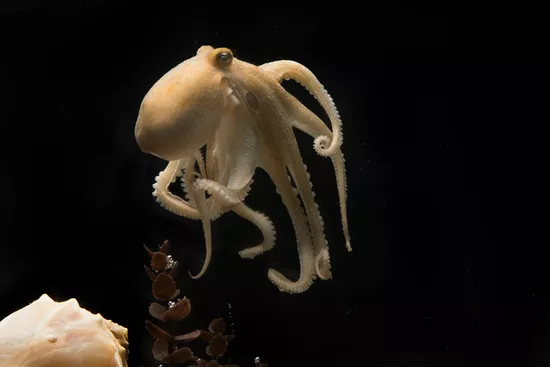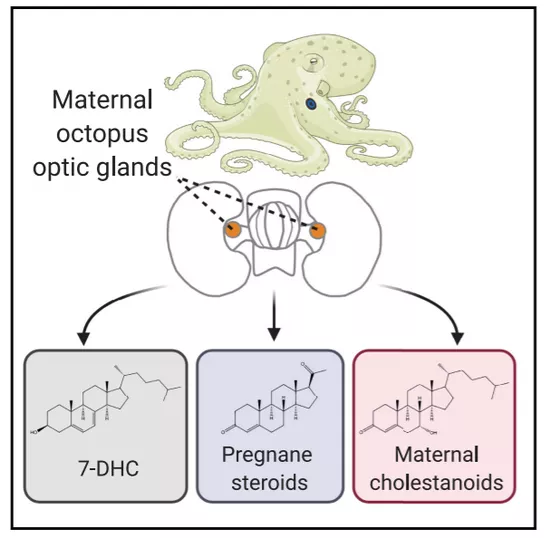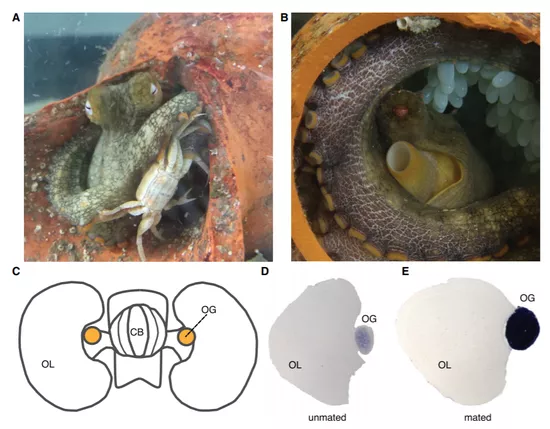Octopus can be regarded as one of the lonely lives. After they are born, they are destined to face the dangerous environment alone. First, female octopus will gradually stop eating and self mutilate after laying eggs. They will peel off their skin and bite off the tip of their tentacles. After the baby octopus was born, its mother had already died. An unknown father will also die months after mating.
Therefore, the story of Little Tadpoles Looking for their mother is basically impossible to appear in octopus.

▲ the special post reproductive behavior of octopus has always fascinated scientists (picture source: reference [2 ], credit: Tom kleindinst, marine biological laboratory)
Octopus's amazing "suicidal" behavior after reproduction has also fascinated many biologists. Initially, the researchers speculated that the mating process would trigger the self destruction mechanism in octopus. Of course, all this is speculation.
Recently, decades after the hypothesis was put forward, some scientists finally found some evidence of self destruction mechanism. Researchers at the University of Chicago found that some cholesterol related signaling pathways change during Octopus mating and affect the levels of various hormones.

Cholesterol itself is an important part of the diet. It is involved in many cell functions, from the toughness of cell membrane to the production of stress hormones.
However, high levels of cholesterol precursors are cytotoxic, so hyperactive cholesterol metabolism can also cause serious developmental and behavioral problems, such as repeated self mutilation or feeding disorders. This seems to be very similar to the behavior of female Octopus after laying eggs.

With this in mind, the University of Chicago molecular biologist Z. Dr. Yan Wang began to decide to look for possible cholesterol related mechanisms.
Here we have to mention a special organ called optic gland in octopus. It was found in 1977. Subsequent studies found that the function of optic gland is somewhat similar to human pituitary, and can affect the sexual development and aging process of octopus.
If the optic glands are removed from female Octopus before mating, they can survive for several months after laying eggs. This indicates that the existence of optic glands may affect the behavior after mating.

The authors have previously found that when octopus is on the verge of death, the gene activity controlling sex hormone and cholesterol metabolism is higher. So they took off the optic glands before and after Octopus mating for detailed analysis. As soon as the results were compared, they found that once mating behavior occurred, the optic glands began to secrete a large number of sex hormones, cholesterol precursors and insulin-like hormones.
The damage of photocholesterol precursors is large enough, and the combination of the three molecules is more helpful to start a series of death signals. With the continuous secretion of three molecules by the optic gland, the self destruction signal received by the octopus also continued to strengthen, and finally began to choose to end itself after reaching the threshold.
Although scientists have known that the optic gland is related to the secretion of sex hormones in octopus, the other two molecules and the connection between the optic gland and suicidal behavior have been shown for the first time.
Clifton Ragsdale, a neurobiologist at the University of Chicago, said: "octopus seem to be abnormal before they die, and these processes they go through lead to this result." There may be other biological pathways, but it is now certain that cholesterol and related derived molecules play a significant role.